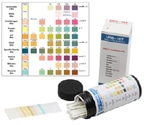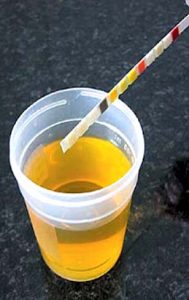Ron Hines DVM PhD
 See What Normal Blood & Urine Values Are
See What Normal Blood & Urine Values Are
 Causes Of Most Abnormal Blood & Urine Tests
Causes Of Most Abnormal Blood & Urine Tests
Glucose In Your Cat and Dog’s Urine
It is never normal for sugar (glucose) to be present in measurable amounts in your dog or cat’s urine. When it does spill over from the blood to the urine, it is usually because your pet’s blood levels are considerably higher than they should be.
Veterinarians use simple, chemically impregnated strips of absorbent paper to test for a variety of things in urine that should not be there. Little squares on the strip turn color when specific urine components are present. The best known one, the Multistix®,  tests for glucose, bilirubin, ketone, specific gravity, blood, pH, protein, urobilinogen, nitrite and leukocyte esterase(a sign of white blood cells and infection).
tests for glucose, bilirubin, ketone, specific gravity, blood, pH, protein, urobilinogen, nitrite and leukocyte esterase(a sign of white blood cells and infection).
Reasons Your Dog Or Cat’s Urine Glucose Test Might Be Positive:
Elevated blood sugar level (hyperglycemia). See my causes of abnormally high blood glucose for the possible reasons for that here. Transient (temporary) hyperglycemia due to stress – particularly in cats, can occasionally cause blood sugar to spill over into their urine. On rare occasion, a pet’s glucose test can be slightly positive after a heavy meal (perhaps those pets are borderline diabetic).
Puppies less than 8 weeks old sometimes have glucose-positive urine.
Certain antibiotics can occasionally damage kidney tubules allowing glucose to escape into the urine (aminoglycosides such as gentamicin) as can inherited kidney dysfunction (primary renal glucosuria). This can occur even when blood sugar levels are within normal limits.
Contamination of the test strips or urine container with hydrogen peroxide or bleach, urinary tract infection with certain bacteria or strips that are out of date can give all give false positives.
Aspirin has been said to cause false positive reaction in humans. Cephalosporins and penicillin antibiotics are said to give false readings (up or down).
There are some rare conditions that cause dogs with normal blood sugar levels to spill glucose into their urine (normoglycemic glucosuria, fanconi’s syndrome). Most cases have underlying genetic causes. The breeds associated with these problems are Scottish terriers, basenjis, Norwegian elkhounds, miniature schnauzers and Shetland sheepdogs.
Other Reasons Your Pet’s Urine Glucose Test Could Might Be Negative:
Just because no glucose was detected in your pet’s urine does not mean it is not diabetic nor that its blood glucose level is normal. That is why checking for urine sugar is not an acceptable or adequate way to manage diabetic pets. If your pet fusses too much to use a glucose meter, have its fructosamine levels checked periodically.
False negative urine glucose results have been reported when humans took vitamin C (ascorbic acid) in large amounts. I do not know if that is the case in dogs or cats.
Complementary Test:
CBC / WBC and blood chemistry panel, urinalysis, fructosamine assay, ACTH stimulation test, blood glucose curve, glycosylated hemoglobin levels, insulin levels
DxMe
 Dear reader, Besides your donations, Visiting the products that you see displayed on this webpage also helps me pay the costs of keeping these articles on the Web. Best wishes, Ron Hines.
Dear reader, Besides your donations, Visiting the products that you see displayed on this webpage also helps me pay the costs of keeping these articles on the Web. Best wishes, Ron Hines.


